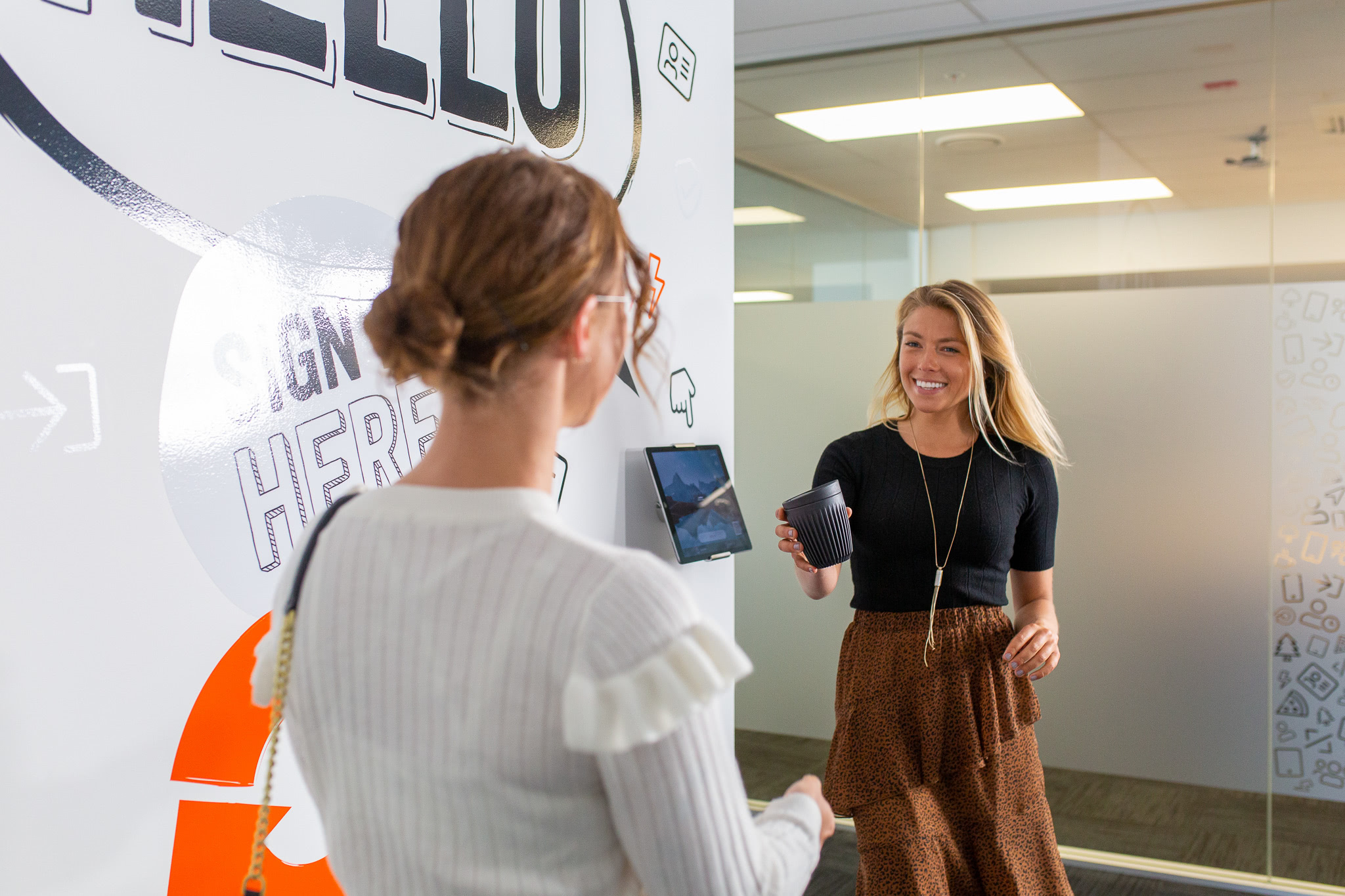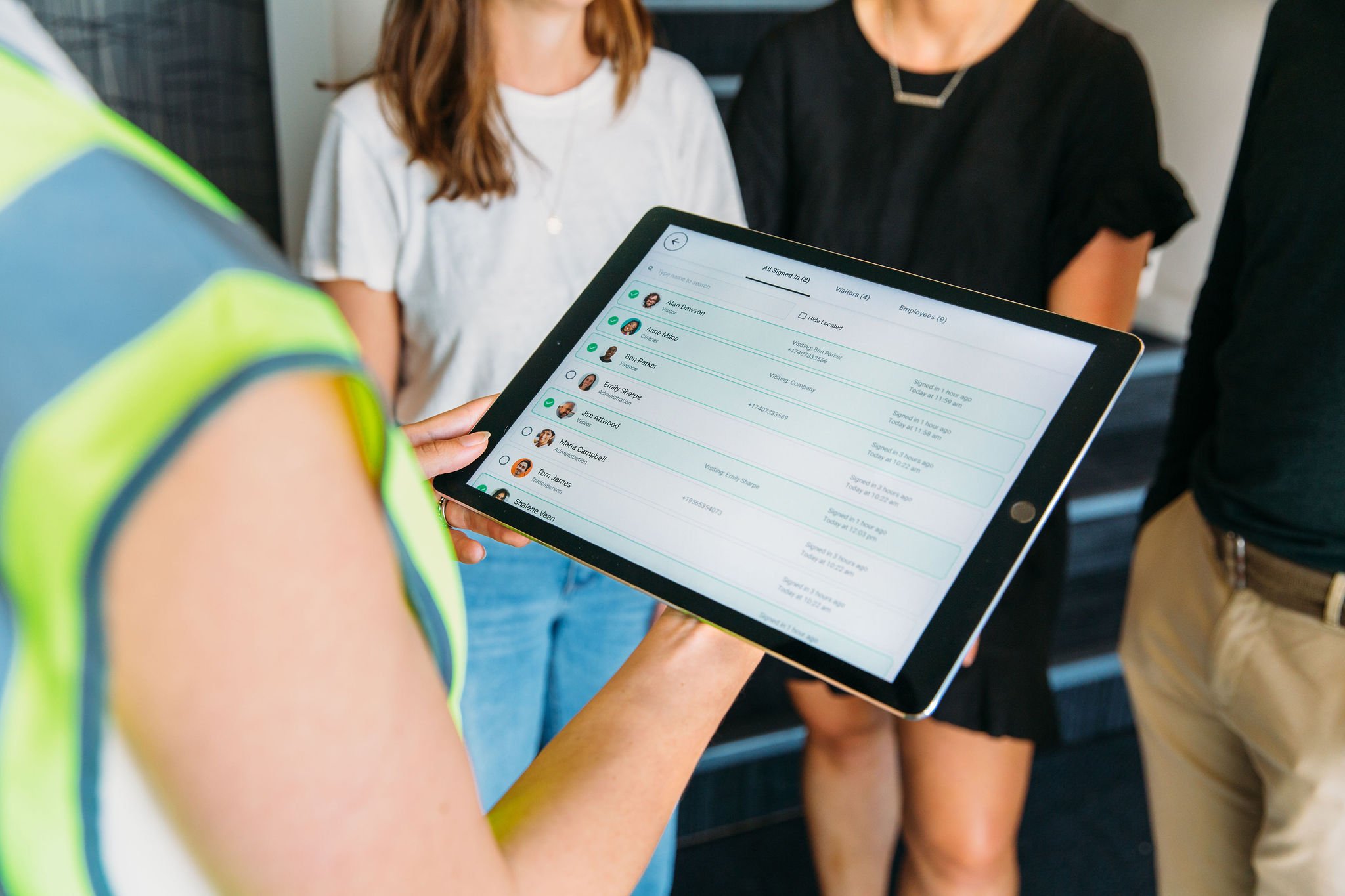5 Small Things You Can Do to Make Your Visitors Feel Comfortable

“You don’t get a second chance to make a first impression.”
While this phrase goes back to at least the 1960s, its relevance applies ever more to businesses today when it comes to welcoming a visitor to your company.
"In spite of the congeniality of many professional gatherings, judgments are being made and impressions formed all the time," says Dr. James Uleman, psychology professor at New York University and impression management researcher. Uleman emphasizes the importance of first impressions when it comes to landing collaborations, deals, sales, and other opportunities.
It only takes 7 seconds for a first impression to form. In most businesses, the first impression visitors will form of your company will come from your reception area. If you want to make a good first impression, it’s critical that your reception team know how to welcome a visitor to your company to make sure any potential partners, existing clients, industry leaders, star job candidates, or any guests entering the reception area feel comfortable and welcomed. To help you out, we’ll go through 5 rules to remember when receiving visitors in the office.
5 Small things you can do to make your visitors feel comfortable
- 1. Make Preparations for Visitors
- 2. Smile and Greet Visitors Warmly
- 3. Anticipate Common Needs
- 4. Make visitors feel safe
- 5. Make Your Lobby Open and Inviting
A visitor management system can help you create the best visitor and employee experience imaginable. Here's how:
1. Make Preparations for Visitors

While most organizations handle visitors as they enter the door, you can take this a step further and send a welcome package via email or mail before the visit. The welcome package can include things like clear location and driving instructions, area maps, parking instructions, directions to enter your organization’s reception area, check-in instructions, a list of biographies of people they’ll come into contact with, a visit itinerary, and anything else you think is necessary.
You can even go the extra mile with SwipedOn and pre-register guests so they don't need to go through the full sign in flow when they arrive at your reception area.
Sending a welcome package is a helpful way to show guests that you’re expecting them and that they matter to you and your business. If you’re preparing for a VIP guest that’s coming to visit from out of town, you can even take care of their travel arrangements, like arranging a car pick up for them from the airport or having someone from your organization to personally pick them up. If they’re spending additional time in your area, why not print out attraction and restaurant recommendations for them?
These thoughtful gestures are a great way to set the tone for a positive and comfortable visitor experience when welcoming a visitor to your company.
2. Smile and Greet Visitors Warmly
According to the Huffington Post, a simple smile can cause others to smile too, decreasing their stress levels, relaxing the body, and serving as a fantastic mood lifter. If a smile alone can help boost your visitor’s mood, imagine what can happen if you make eye contact with your guests and greet them by their name. In an age where AI is prevalent, it's more important than ever to offer an authentic human connection as part of the visitor experience.
The key consideration for handling visitors in the office, is to ensure they feel like you’re happy to see them and their presence is expected and welcome. Achieving these goals requires an attentive front-desk staff and a specific procedure or protocol for greeting guests. You should let your receptionist staff know of your expectations for welcoming a visitor to your company. For example, when guests arrive, a front-desk staff member needs to smile and make clear eye contact, followed by a standard greeting such as, “Good morning/afternoon - welcome to our organization, how can I help you?”
To ensure your front-desk staff are handling visitors attentively, establish a company culture that’s respectful of administrative staff. It’s hard for front-of-office staff to be happy, friendly, and welcoming to visitors if they’re overwhelmed with tasks. Avoid giving your receptionists too much work that will be derailed by frequent interruptions.
Software tools like a workplace sign in system automate the visitor the check-in process so your front desk staff have more time to handle your visitors' needs.

3. Anticipate Common Needs
While your visitor’s goal may be to attend their meeting, they often have other needs as well which need to be handled appropriately. For example, upon arrival, your visitors may need to use the restroom. They may also feel thirsty and could use a cup of water or coffee, or they may be feeling a bit hungry and would like some light refreshments. If your office is in a large building, your visitors might require clear instructions to get to the floor or room of their meeting.
To help your visitors feel more comfortable we recommend you offer refreshment options, building directories, and visibly display signs pointing to restrooms. Today’s visitors may also request a charger to charge their phones while waiting. Making sure phone charging stations are readily available will show your organization’s level of thoughtfulness when it comes to handling visitors in the office.

4. Make visitors feel safe
Visitors also need to know they can feel safe in your facility. The SwipedOn workplace sign-in system plays a pivotal role in ensuring that your visitors feel safe and secure from the moment they step through the door. By allowing visitors to check in digitally, SwipedOn ensures that sensitive personal information is securely stored and protected, alleviating concerns about data breaches.
This level of data security not only demonstrates a commitment to visitor privacy but also fosters trust, as visitors can confidently provide their information knowing it won't be mishandled. The system's compliance with data protection regulations provides an added layer of reassurance, creating a positive and secure first impression for visitors.

In the event of an emergency, workplace sign in software means you can swiftly and accurately identify who is present, including visitors, enabling efficient and potentially life-saving evacuation procedures. This real-time visibility ensures that everyone is accounted for, minimizing the risk of leaving anyone behind during an evacuation. B
y seamlessly merging visitor check-in with emergency preparedness, SwipedOn empowers organizations to prioritize the safety of their visitors and employees alike, instilling a sense of confidence and well-being among all who pass through their doors. Overall, SwipedOn's workplace sign-in system goes beyond mere visitor registration; it's a comprehensive solution that contributes to an environment where safety and privacy are paramount.
Taking a proactive approach to your visitor sign in is a great way to show that you take your guests' safety and security seriously, which reflects well on your organization.
5. Make Your Lobby Open and Inviting
 Apart from welcoming visitors, it’s important to make sure your reception area is as warm and inviting as possible. First, the reception area should be on-brand, well-lit, and clean, with a comfortable place they can sit while waiting to be seen.
Apart from welcoming visitors, it’s important to make sure your reception area is as warm and inviting as possible. First, the reception area should be on-brand, well-lit, and clean, with a comfortable place they can sit while waiting to be seen.
Going the extra mile to make your reception area interesting will help establish a positive first impression when welcoming a visitor to your company. We recommend adding sensory experiences like a nice relaxing playlist, a fresh scent, and some greenery to brighten up the space and give it a bit more color.
“Greenery is a simple and inexpensive way to brighten up any room, especially a small office lobby design. The best place to keep small plants is on a side table where they can be out of the way and will not get knocked over. If you have a large floor plant, you can tuck it in the corner, out of the way,” says Lauren Romano, contributing writer at BizFluent.
Making a good first impression when welcoming a visitor to your company doesn’t have to be overly complex or difficult. You can start by preparing ahead for guest visits, training staff members to be warm, attentive, and friendly to guests at all times, anticipating your guests common needs, and improving your lobby so it’s more open and inviting. Not only will these strategies help elevate and create an inviting waiting room atmosphere, but are also an important first step in providing an exceptional visitor experience with your company.
If you want to work on making your visitors feel more comfortable today, get in touch with us for a free trial.
Featured Image: Nikolai Chernichenko
More from the blog
4 Ways to Modernize Your Front Desk
4 Ways to Make Every Office Visitor Feel Welcome
Brand Love at First Sight: How to Showcase Your Brand at Your Office’s Reception
7 Simple Yet Powerful Reception Area Ideas For Your Business



-929560-edited-003563-edited.jpg)





 Germany - Deutsch
Germany - Deutsch